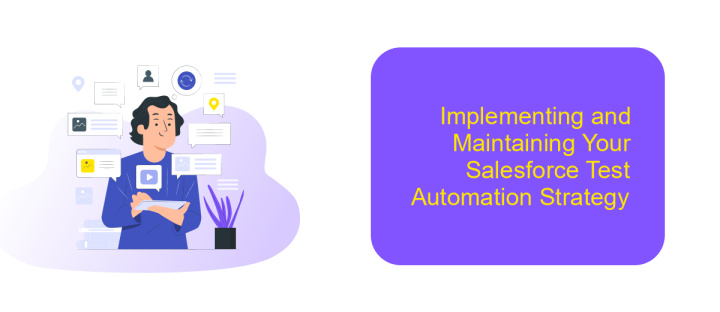Salesforce Automation Test Platform
In today's fast-paced business environment, the need for efficient and reliable software solutions is more critical than ever. The Salesforce Automation Test Platform emerges as a powerful tool, designed to streamline and enhance the testing process for Salesforce applications. By automating repetitive tasks, it not only accelerates deployment but also ensures higher quality and consistency, ultimately driving better business outcomes and user satisfaction.
Introduction to Salesforce Test Automation
Salesforce Test Automation is an essential component of ensuring the reliability and efficiency of Salesforce applications. As businesses increasingly rely on Salesforce for their customer relationship management, the need for robust testing solutions becomes paramount. Test automation streamlines the process of validating the functionality, performance, and security of Salesforce applications, reducing manual effort and minimizing human error.
- Increased testing speed and efficiency
- Consistent and repeatable test processes
- Early detection of defects and issues
- Reduction in manual testing efforts
- Improved test coverage and accuracy
Implementing Salesforce Test Automation allows organizations to keep pace with rapid software updates and enhancements, ensuring that new features do not disrupt existing workflows. By automating repetitive testing tasks, teams can focus on strategic initiatives, such as improving user experience and expanding Salesforce capabilities. Ultimately, test automation empowers businesses to deliver high-quality Salesforce solutions that meet the evolving needs of their customers.
Key Features and Benefits of a Salesforce Automation Test Platform

The Salesforce Automation Test Platform offers a comprehensive suite of features designed to streamline and enhance the testing process. One of its key features is the ability to automate repetitive test cases, significantly reducing manual effort and increasing efficiency. The platform supports seamless integration with various tools and services, ensuring a smooth workflow. For instance, integrating with ApiX-Drive can simplify data synchronization and automate triggers across different applications, enhancing the overall testing ecosystem. Additionally, the platform provides detailed reporting and analytics, enabling teams to gain valuable insights into test results and performance metrics.
Among the benefits of using a Salesforce Automation Test Platform is the improvement in test accuracy and consistency. Automated tests minimize human error and ensure that test cases are executed uniformly every time. This leads to faster identification of defects and quicker resolution, ultimately reducing time-to-market for Salesforce applications. Furthermore, the platform's scalability allows it to handle growing test demands, accommodating expanding businesses effortlessly. By leveraging such a platform, organizations can achieve higher quality assurance standards, increase productivity, and ensure a robust Salesforce environment.
Choosing the Right Salesforce Test Automation Tools

When selecting the ideal Salesforce test automation tools, it's crucial to consider various factors that align with your project's requirements. The right tool can significantly enhance testing efficiency, reduce manual efforts, and ensure a seamless integration with Salesforce's dynamic environment. Begin by evaluating the specific needs of your organization and the complexity of your Salesforce implementation.
- Compatibility: Ensure the tool is compatible with the latest Salesforce updates and features.
- User-Friendly Interface: Opt for tools with intuitive interfaces to facilitate ease of use for testers.
- Integration Capabilities: The tool should seamlessly integrate with existing CI/CD pipelines and other development tools.
- Scalability: Choose a tool that can scale with your business as it grows and evolves.
- Support and Community: A strong support system and active user community can be invaluable for troubleshooting and guidance.
Ultimately, the decision should be based on a thorough analysis of the tool's features, cost-effectiveness, and the specific testing needs of your Salesforce environment. By carefully considering these factors, you can ensure a successful implementation that enhances the overall quality and reliability of your Salesforce applications.
Implementing and Maintaining Your Salesforce Test Automation Strategy

Implementing a Salesforce test automation strategy requires careful planning and execution. Begin by identifying the core business processes that need testing, ensuring they align with your organizational goals. Select the appropriate automation tools that integrate seamlessly with Salesforce, considering factors like ease of use, scalability, and support.
Once your tools are in place, design test scripts that accurately reflect your business workflows. It's crucial to involve key stakeholders, including developers and quality assurance teams, to ensure comprehensive coverage. Regularly update these scripts to accommodate any changes in Salesforce updates or business processes.
- Define clear objectives and success metrics for your automation strategy.
- Establish a robust framework for test data management.
- Schedule periodic reviews and updates to your test scripts.
- Train your team on best practices and new features.
Maintaining your Salesforce test automation strategy involves continuous monitoring and optimization. Regularly analyze test results to identify areas for improvement, and adjust your strategy accordingly. By fostering a culture of collaboration and continuous learning, your organization can maximize the benefits of Salesforce test automation.


Best Practices and Future Trends in Salesforce Test Automation
Implementing best practices in Salesforce test automation involves ensuring comprehensive test coverage, maintaining an organized test suite, and utilizing robust tools. It's crucial to regularly update test scripts to align with Salesforce's frequent updates and releases. Leveraging cloud-based test environments can enhance scalability and flexibility. Additionally, integrating with tools like ApiX-Drive can streamline workflows by automating data integration processes, thus reducing manual intervention and potential errors.
Looking towards future trends, the integration of AI and machine learning in test automation is set to revolutionize the landscape. These technologies can predict potential failures and optimize test cases, improving efficiency and accuracy. The rise of low-code platforms will also enable more teams to participate in test automation without extensive programming knowledge. As Salesforce continues to evolve, staying abreast of these trends will be essential for maintaining a competitive edge in automation strategies.
FAQ
What is Salesforce Automation Test Platform?
How does automation testing benefit Salesforce applications?
What types of tests can be automated in Salesforce?
How can I integrate third-party services for Salesforce automation testing?
What are the challenges of Salesforce automation testing?
Apix-Drive will help optimize business processes, save you from a lot of routine tasks and unnecessary costs for automation, attracting additional specialists. Try setting up a free test connection with ApiX-Drive and see for yourself. Now you have to think about where to invest the freed time and money!

